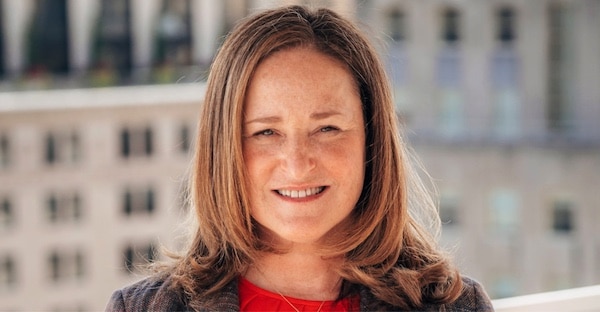Janine Jackson interviewed UNRWA USA’s Mara Kronenfeld about Israel’s aid blockade for the May 16, 2025, episode of CounterSpin. This is a lightly edited transcript.
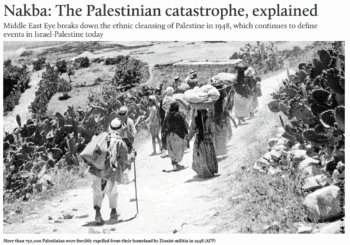
Middle East Eye (5/14/25)
Janine Jackson: It’s long been said of the turmoil in Israel/Palestine that your understanding is shaped by when you’re told to start the clock. Corporate news media’s deliberate timekeeping sets up the story we’re used to, in which Palestinians are always attacking and Israel is always only responding, and Israel’s long, violent occupation, and now genocidal operations against the people of Gaza, for example, becomes a matter of recurring “clashes” between presumably balanced forces.
Into this landscape comes the 77th anniversary of the Nakba, May 15. For media, talking frankly about the 15,000 Palestinians killed, the at least 750,000 driven from their homes and land, for the 1948 founding of the state of Israel might force a context into coverage of today’s events, beyond vague gestures toward the region’s “troubled history.”
We’re learning how hard some will fight to prevent that understanding. In the struggle to defend Palestinian lives, the protection of history is tied up with the witnessing of today.
Mara Kronenfeld is executive director at UNRWA USA. UNRWA is the UN Relief and Works Agency for Palestine Refugees in the Near East. She joins us now by phone; welcome to CounterSpin, Mara Kronenfeld.
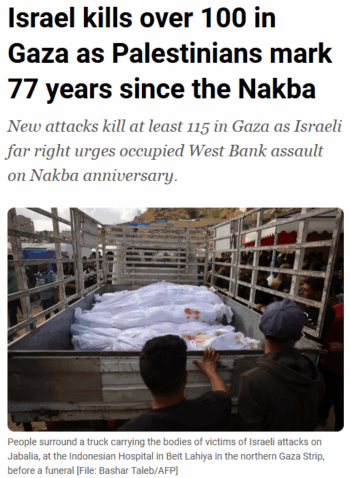
Al Jazeera (5/15/25)
Mara Kronenfeld: Thank you so much. It’s a pleasure to be here.
JJ: I want to ask you about attacks on aid and about disinformation, but we are recording on May 15. I just wonder, first, what your thoughts are on what this time of remembering, of acknowledgement, means today.
MK: Yes, it’s a day, a difficult day, any May 15, and this is of course the 77th commemoration of the Nakba, but it’s only that much more painful after this morning, hearing that Gaza is yet again, yet another day of major attacks. We’re hearing of upwards of 100 civilians killed just this morning, and 77 yesterday. So it’s a painful reminder that the struggle continues, that Palestinian fathers, mothers, children are under attack, and that Palestinians, like any other people on Earth, want to live free of occupation, and have control over themselves and sovereignty. And this seems well farther off than it has, unfortunately, for a long time.
JJ: Gaza has been under blockade since March, listeners will know, the hunger, the lack of medicine, the repeated displacement, destruction of hospitals—after decades, of course, of occupation—all contributing to the nightmare. But now we also see targeted, lethal attacks on aid workers themselves, and efforts to—you could say “politicize,” but really criminalize the work of aid organizations. This seems new, or is it?
MK: Yeah, there’s been a long-time campaign, frankly, against UNRWA, the UN Relief and Works Agency for Palestine Refugees. I wish I could say this is new. I think the vehemence and the coordinated aspects of the attacks are perhaps new, but UNRWA has always represented a threat, in the sense that it appears to guarantee the right of return for Palestine refugees, even though that right of return is embodied under a separate UN resolution. But it represents that, in fact, the 5.6—some million refugees that UNRWA is serving are refugees and, in fact, do hope to return home to a land that is under their sovereign control, in whatever political solution the political parties determine at the right time.
The attack against UNRWA—and by the way, I am the executive director of UNRWA USA, which is actually a separate, independent, U.S.-based NGO. Our mission is really to raise awareness about the work of the UN agency UNRWA, and raise funds for its relief and development programs in the Middle East, of course, for these 5.6 million refugees. But we have seen the propaganda against UNRWA, and, by extension against our small team, absolutely ramp up in the days and months and, unfortunately, now years following the horrific events on October 7.
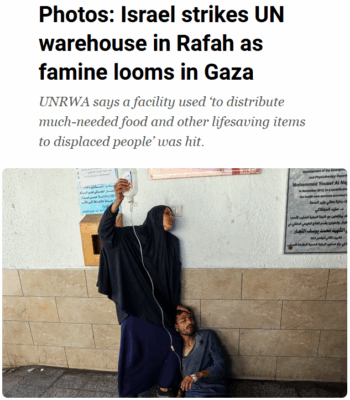
Al Jazeera (3/13/24)
You can almost directly link the attacks on UNRWA to, yes, the fact that it embodies this right of return, but also UNRWA is simply being attacked because it keeps Palestinians alive. And as we’ve seen in this brutal, 20-month assault on Gaza, on the civilians of Gaza, collective punishment, and now we’re into almost the 70th day of a total blockade on food and medical aid-—again, collective punishment on an entire population, including 1 million children. We’re seeing that any attempt to keep this population alive, educated, sheltered is a threat to this current extremist government in Israel. And that’s the very reason UNRWA is attacked.
JJ: It’s a kind of a pincer move, because there are the actual missiles being dropped on warehouses where UNRWA is working, and on medical centers, and then also this simultaneous drive to say that UNRWA is not a legitimate organization, that really it’s just part of Hamas, and that therefore it should be sued into extinction, is my understanding.
MK: Yes, there’s attacks on many levels, and I will say, and I think it’s worth mentioning here, that there are probably hundreds of accusations against UNRWA by the Israelis. The commissioner general of UNRWA Philippe Lazzarini has consistently and continually stated that if there are allegations, then UNRWA needs to see the documentation, needs to see the evidence.
Israel has a history of making allegations, of calling many different independent individuals and organizations “Hamas” or “terrorists” without any evidence. UNRWA cannot respond to every piece of conjecture in an extremely politicized environment. But in the one case where an accusation by Israel, that 19 members of UNRWA’s 33,000 employees may or may not have taken part in the horrific events of October 7, in only nine of these cases where Israel actually presented evidence, I have to say that if authenticated and corroborated—it hasn’t been—but if it could have indicated that [they] were guilty, UNRWA has done the right thing, in the sense of firing these individuals.
UNRWA’s Commissioner General Philippe Lazzarini has stated emphatically that the engagement of any UNRWA employees in such activities, if so, if it were true, would, in fact, be an appalling betrayal of both Palestine refugees, the United Nations and UNRWA specifically. UNRWA made very clear that it has no tolerance for such activity.
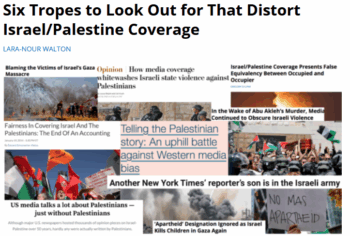
FAIR.org (8/22/23)
You said in the beginning of your introduction, the corporate media have chosen to tell a much different story, and I can tell you, working at UNRWA USA for five years, a story that’s fundamentally not true. And then you have attacks by certain members of this administration, which try to claim that UNRWA does not have immunity like every other United Nations entity, and that somehow UNRWA, established in 1949 by mandate of the member parties of the UN, is not a subsidiary of the United Nations, when Israel itself calls UNRWA a subsidiary of the United Nations.
The attacks, if they weren’t so dangerous and deadly—as yet, there’s been over 280 UNRWA staff members killed—would be laughable, but unfortunately we are in this crazy media environment, where too many allegations are somehow not checked, or repeated, and there are certain political opinions that hold sway in certain corporate newsrooms. That’s why I can tell you, as an individual, I’m so thankful for your work, for FAIR’s work, and for those who really try to understand what is underneath all of the propaganda and disinformation that we see every day.
JJ: I’m going to ask you a little bit more about media in a second, but I just, as a point of information, because it can get lost: Israel, as an occupier, is required by law to allow aid, is it not? I mean, they’re required by international law to allow aid access into occupied territories.
MK: A hundred percent. That is one violation of international law, absolutely. And we’re talking about, again, into the 70th day of a population of 1.9 to 2 million being denied commercial goods, but a thousand times worse, food and aid.
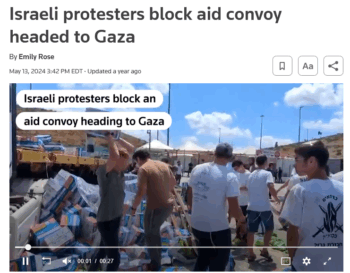
Reuters (5/13/24)
And I don’t know about you, Janine, but I’ve seen, every day now, more and more photos of children who look malnourished. Just this morning, a horrific image of a child who was bombed, and one leg was severely injured, and the other leg is so skinny, it’s barely there. It is something that I wonder—we all wonder, those of us who are compassionate and thinking individuals—how the world can watch and let this happen, how the uproar is not loud enough to stop the withholding of basic food and medicine, now for over 70 days.
JJ: Many are wondering why the response from the world is not what we think it should be, but we think it merits, and we—you and I—understand that media do play a role there. Using aid as a lure to drive Palestinians south, suggesting that providing food and water to people in Gaza is somehow akin to terrorism. This is part of what Francesca Albanese, I just heard, called “the tapestry of crimes against the totality of the people.” And I know that you and others contend that these crimes are made possible, in part, by dehumanization of Palestinian people, and that news media play a central role there.
MK: Yes, yes, I’ve seen that and it’s been both in my professional and my personal life. I happen to be Jewish, married to a Muslim gentleman, and I think about my own kids, and I think about, in their lifetime, are we going to be more concerned about antisemitism or Islamophobia and anti-Arab hate? And while both are on the rise, I’m more concerned, in fact, about the portrayal of Muslims and Arabs in the media. And I think that this dehumanization of Palestinians is unique, definitely, because of the politicization of this issue. But it does have roots in the dehumanization of Muslims and Arabs that, unfortunately, our country has a long history of.
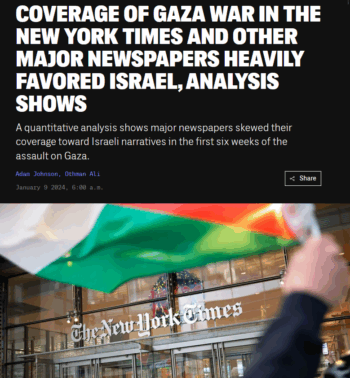
Intercept (1/9/24)
And definitely the media has played a huge role in furthering this dehumanization. There was a report out on a study of some thousand articles from the major newspapers, the New York Times, the Washington Post and the LA Times, and this was looking at all the articles, about a thousand articles, following the horrible attacks on October 7.
And what we saw is that “Israeli” or “Israel,” both terms, generally got far more mentions in news stories than “Palestinians” or variations thereof, even as Palestinian deaths massively far outpaced Israeli deaths. And we see really condemnatory adjectives, like “slaughter,” “massacre,” “horrific,” when they’re applied to Israeli citizens, not when they’re applied to Palestinian victims, even at a time when the Israeli military had killed upwards of 6,000 children in Gaza.
And what is extremely frightening is seeing the genocidal language of this extremist government, and seeing almost that idea that we hear from this government that the children of Gaza are born evil; they’re born “snakes.” Imagine a news agency saying this about Jewish people, about my ancestors, that somehow they were born evil, they were born snakes. This kind of language being used has only served to dehumanize and prepare for the genocidal actions we’re seeing right now.
But, unfortunately, our media is culpable in making Palestinian victims, changing them from victims to terrorists, including a million children who are trying to stay alive at this very minute, let alone their mothers and let alone their fathers. We’ve seen Palestinian fathers absolutely dehumanized at a level just outrageous, and which doesn’t match with any of my experiences, my long experiences, living and working in the Middle East region.
JJ: On top of the more than 52,000 people killed since October 7, we have Israeli officials now openly declaring plans to reoccupy Gaza indefinitely, to use destitution and displacement to force Palestinians out, though neighboring countries say they don’t plan to take them. I would say appropriate reporting would not look like this, from the Guardian on May 6, that said that an Israeli government minister has vowed that “Gaza will be entirely destroyed” and Palestinians will “leave in great numbers to third countries.” And the Guardian said, this is “raising fears of ethnic cleansing in the occupied territory.”

Mara Kronenfeld: “Why hasn’t something happened to stop the killing already? And the displacement of 90% of the population?”
I feel that along with the day-to-day dehumanization and erasure of Palestinian lives, there’s also this kind of diplomatic dance that’s always like, It might turn into s omething that could be bad. There are warnings that it might be something to worry about. And it kind of leaves you to wonder: Media, what would you do if you thought it was ethnic cleansing? Why is it always “about to be,” or it’s someone “claiming that it is”? There’s a hesitancy that, to me, is very frustrating.
MK: Oh yeah. So we’ve seen that around famine, that in other situations in which famine was predicted at the level, it has been predicted at different times than Gaza, it was declared famine. And we just don’t see that kind of collective statement or action when it comes to Gaza.
And what we’re seeing now looks very much like ethnic cleansing. I’m not an international law specialist, but one does wonder why we’re not talking about interventions now, as opposed to some moment in the future, when we’ve already seen likely well more than 52,000 deaths. That’s the count that the Ministry of Health has tried to keep going, despite being nearly bombed out of existence. But the Lancet, the British Lancet, had stated in that second report towards the end of 2024, that the actual death count was probably more like 60,000 in the first six months of 2024. And if we count the second six months, when the bombing was even more brutal, we could be talking of upwards of 120,000 deaths. And at the very minimum, we’re talking about 17,000 children. The true number is probably much, much higher.
So your question is very well taken. Why hasn’t something happened to stop the killing already? And the displacement of 90% of the population, from families displaced over 12 times in the last two years, with just a blanket and the clothes they’re wearing to carry with them from place to place?
The depravity goes on and on. And I found myself repeating the statistics for the last 20 months, and I’m just continually shocked that I’m not seeing, the horror that I feel, I’m not seeing it reflected in the corporate media.
And I tell everyone I talk to that we just can’t rely on traditional media. We have to be looking at video straight from Gaza, we have to be looking at independent news sites, because we’re just simply only going to get a very small part of the story.
JJ: Finally, we see that, despite the virulence, the wildness of the crackdown—student reporters being suspended, being arrested, simply for reporting on police assaults on campus protesters, the circulating of Do Not Hire lists of people who protest, threats to strip nonprofit status from groups that step out of line—it’s just not working. It’s silencing many people, of course, but at the same time, more and more people are speaking up. Stanford students have just started a hunger strike. Polls are showing large numbers of people don’t want their tax dollars going to Israel’s military. They’re trying to make it very scary to condemn this nightmare, and people are doing it anyway.
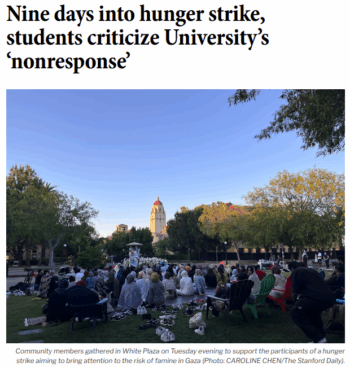
Stanford Daily (5/21/25)
MK: Yeah, the power of the people has been, frankly, beautiful, something extremely powerful to behold. And we’ve seen that play out at UNRWA USA, where our donor base was just some 7,000 in early October 2023. We saw our donor base grow 146,000 people since October 2023. And don’t let anybody tell you otherwise, these donors are from every state in the union, every ethnic background. I can’t tell you how many Jewish people donated on Passover in 2023 and 2024, talking about what Passover means, freeing the oppressed from affliction. We have seen, in just that snapshot of support for us, that American people are compassionate and are caring, and it’s really the elites who are trying to tell a different story, and a false story, that, thankfully, many folks in this country are too smart to swallow.
And I’ll just say that I view my work at UNRWA USA of serving the essential humanitarian needs of a population that is under brutal assault, which genocide scholars, including many, many in Israel, are calling a genocide. It is a badge of honor to provide humanitarian aid for a population that is under collective punishment.
And I’ll tell you that I do this, like so many, because “Never Again” is not just never again for the Holocaust, for Jewish people, for my grandfather who escaped Nazi Germany, “Never Again” is for anybody. And so as hard as this moment is, in terms of the repression in this country, I am honored to work beside my colleagues at UNRWA USA, many Palestinians, and beside all of the brave people in this country who refuse to swallow the narrative, the false narrative, that’s being handed to them.
JJ: We’ve been speaking with Mara Kronenfeld of UNRWA USA. Mara Kronenfeld, thank you so much for joining us this week on CounterSpin.
MK: Thank you.

